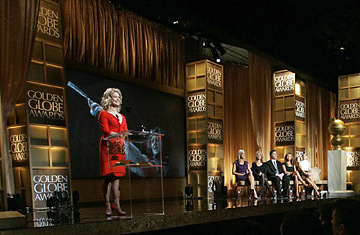
Mary Hart presents the Best Motion Picture Award, musical or comedy, to Sweeney Todd at the Golden Globes in Beverly Hills, California.
(2 of 2)
The HFPA has taken heat for being a club of undistinguished foreign newsmen, desperately avid for access to the stars. Show business reporters for some top newspapers (The Times of London and Le Monde, for example) are not among its members (though others, including The Daily Telegraph and Rome's La Reppublica, are.) But the important point isn't the pedigree of the journal; it's the job of the journalist. And the job of most HFPA members is to cover the entertainment industry, not to write film reviews. They should be voting on Most Cooperative Actor, Least Obstructive Publicist, Best Free Hors d'Oeuvres (Premiere or Junket).
Actually, the parasitic relationship of the HFPA to the movie industry is part of its raffish charm. The group was founded in 1945, the same year as the United Nations, and in the spirit of postwar amity its first awards list included a citation for Best Film for Promoting International Good Will. But the Association soon found a way to distinguish itself from the Oscars: by giving prizes for people who don't win Oscars. In 1950 it instituted a Most Promising Newcomer award. (What the young actors had to promise the members remained vague.) This was the category that, 22 years later, brought scandal on the HFPA when shady businessman Meshulam Riklis invited the gang to Las Vegas to meet his young wife, Pia Zadora, then gracing a turkey called Butterfly (Diving Bell not included), and, presto, she won the prize.
Through the 50s, the HFPA found inventively silly ways to honor celebrities who might never grace an Academy Award stage. Guy Madison was named Best Western Star (for acting in horse operas, not visiting the hotel chain). A category called World Film Favorite could be roughly translated as: a famous person who'll come to our party. Early winners here included Marilyn Monroe, Kim Novak and swimming star Esther Williams. In 1956 Williams received a second honored: the Hollywood Citizenship Award. (Only two of these were handed out, Ronald Reagan winning the other one.) Zsa Zsa Gabor was named Most Glamorous Actress in 1958, the year she starred in the no-budget sci-fi farce Queen of Outer Space. Considering that Zsa Zsa was mainly famous for her many marriages (now 90, she's been wed nine times), the citation was really kind of a Wife Achievement Award.
Some of the HFPA's goofier inspirations have stuck, like the Miss Golden Globe designation, begun in 1963 in homage to the sweet young thing of the moment. The honoree usually comes from Hollywood royalty (Tippi Hedren's daughter Melanie was Miss G.G. in 1975, and 31 years later the slot went to Griffith's daughter Dakota Johnson). It's one more way of guaranteeing that one more proud parent, who just happens to be a movie star, will show up.
This year, though, nobody showed. Blanchett graciously issued a thank-you statement anyway. Schnabel watched the show on an airport TV set, and told a reporter he was pleased. The rest presumably saved their acceptance speeches in hopeful anticipation of delivering them on the Oscar show — if there is one. I have to say that, for all the flak the usual Globes dinner takes, I missed the parade of the elite, the witticisms and platitudes, the stars chatting one another up, or stuck in traffic or the bathroom. I can forgive the Hollywood Foreign Press Association almost anything, so long as, next year, they lure their famous guests back to their party.
